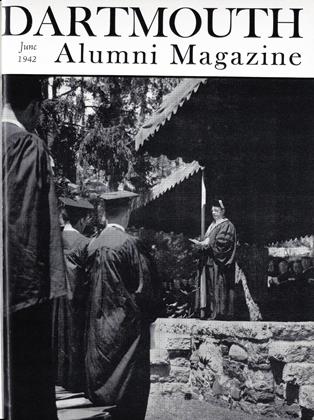"The Treasury advanced the idea in a time when college and charitable bequests are drying up, anyhow, because of heavy taxes on individuals and corporation, war bonds and other subscription campaigns and the disappearance of large fortunes. These conditions have already given to the colleges and the charities problems of financing which in many instances are desperate
"Is it the purpose of those behind the move to make up to the colleges by Federal subsidy the subsistence funds they would lose? This is a question which is being asked in alarm by educators who see no other way to keep their institutions going if the Treasury prevails. If that is the remedy in mind, then a growing measure of Federal control over higher education would ensue for the first time in the country's history, and that prospect may well alarm the public as well as the educators."
"The question is asked because they do not see how the proposal would assure to the government additional revenue for its present, or war, needs, and this additional revenue is supposed to be the basic purpose of the new tax bill. The limitation on deductions of estates could apply only to future deaths, and there follows the eighteen-month lag before penalty tax provisions are imposed. Therefore the Treasury's suggestion could bring in no 1942 revenue, and not much next year and the year thereafter.
"Then there is the psychological effect which such a provision would probably have on many prospective donors. If they are obliged to calculate a large tax in addition to a large charitable contribution, they will not make the bequest at all, human nature being what it is. Accordingly, critics and intended victims of the new tax see in it social legislation and not a revenue measure, since the Treasury suggests no distinction between charitable corporation setups designed to "perpetuate family control over wealth without paying the estate tax" and those which are admittedly above criticism in intent and administra- tion.
"Charitable and similar organizations have never before been required to make returns, and the Treasury lacks full information regarding them. But now it has called for returns by May 15, and opponents of Mr. Paul's proposal are urging that it be suspended until the data are complete and a fair line of demarcation can be drawn (if a fair distinction, and not Federal control of higher education is the end that really is sought)."
affords relaxation and year 'round seasonal recreation. Visit the College, 18 miles distant—transportation available. The Lodge combines the charm of colonial New Hampshire with modern comfort and satisfying meals. Write or telephone (Canaan 24) for details.
The Austins—Canaan Street—New Hampshire
 View Full Issue
View Full Issue
More From This Issue
-
 Article
ArticleCollege Graduates Return
June 1942 -
 Class Notes
Class Notes1927 Has Its Quindecennial
June 1942 By DOANE ARNOLD '27 -
 Class Notes
Class Notes1937 Holds Its Fifth Reunion
June 1942 By JOHN H. DEVLIN JR. '37 -
 Class Notes
Class Notes'Seventeen's Silver Jubilee Wins Cup
June 1942 By MOTT D. BROWN JR. '17 -
 Article
ArticleValedictory to Class of 1942
June 1942 -
 Article
ArticleFirst War Class Graduates
June 1942
Article
-
 Article
ArticleJob Expert
February 1941 -
 Article
ArticleFaculty Fellowship
January 1961 -
 Article
ArticleQuality of Life
JAN./FEB. 1980 -
 Article
ArticleReport: Boom Benefits African-American Men
NOVEMBER 1999 By Davida Dinerman '86 -
 Article
ArticleHANOVER BROWSING
June 1936 By Herbert F. West '22 -
 Article
ArticleHanover Browsing
June 1951 By HERBERT F. WEST '22

